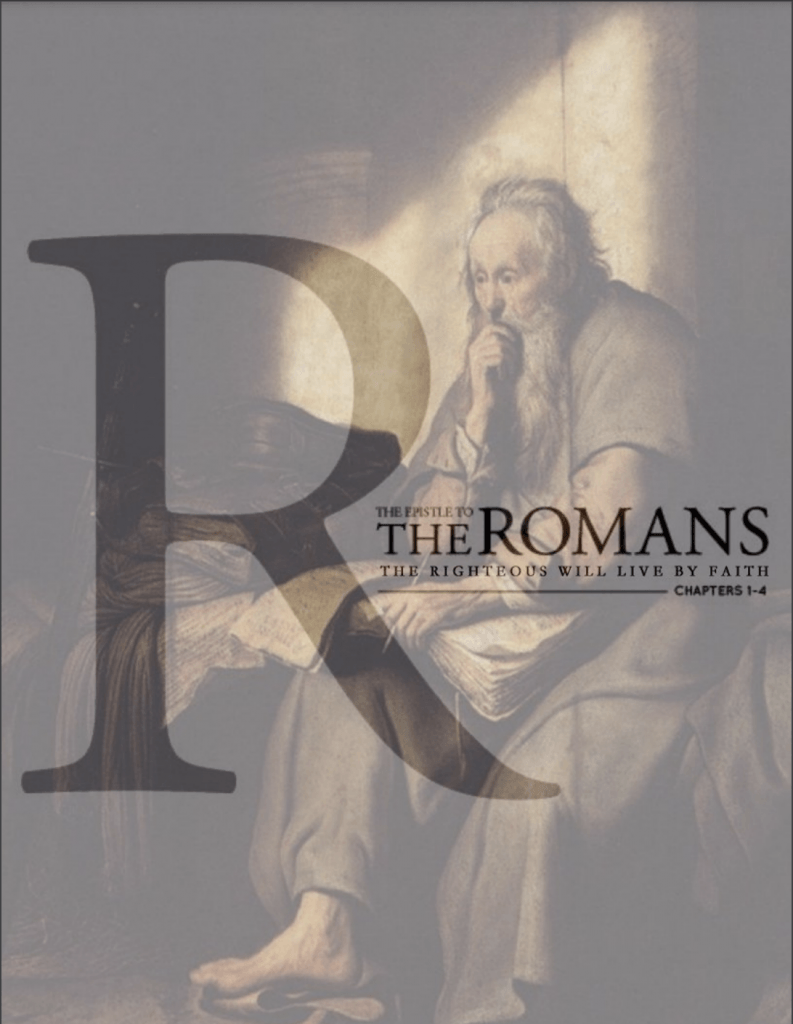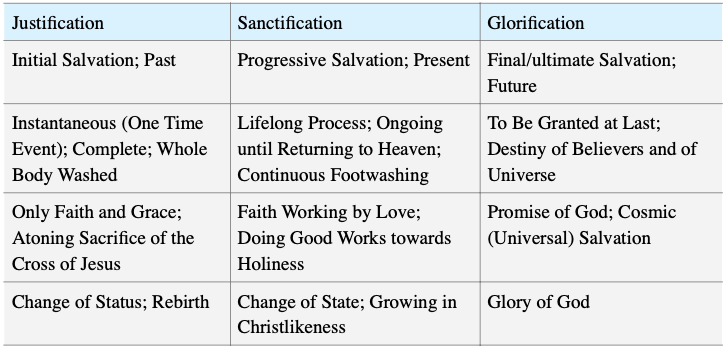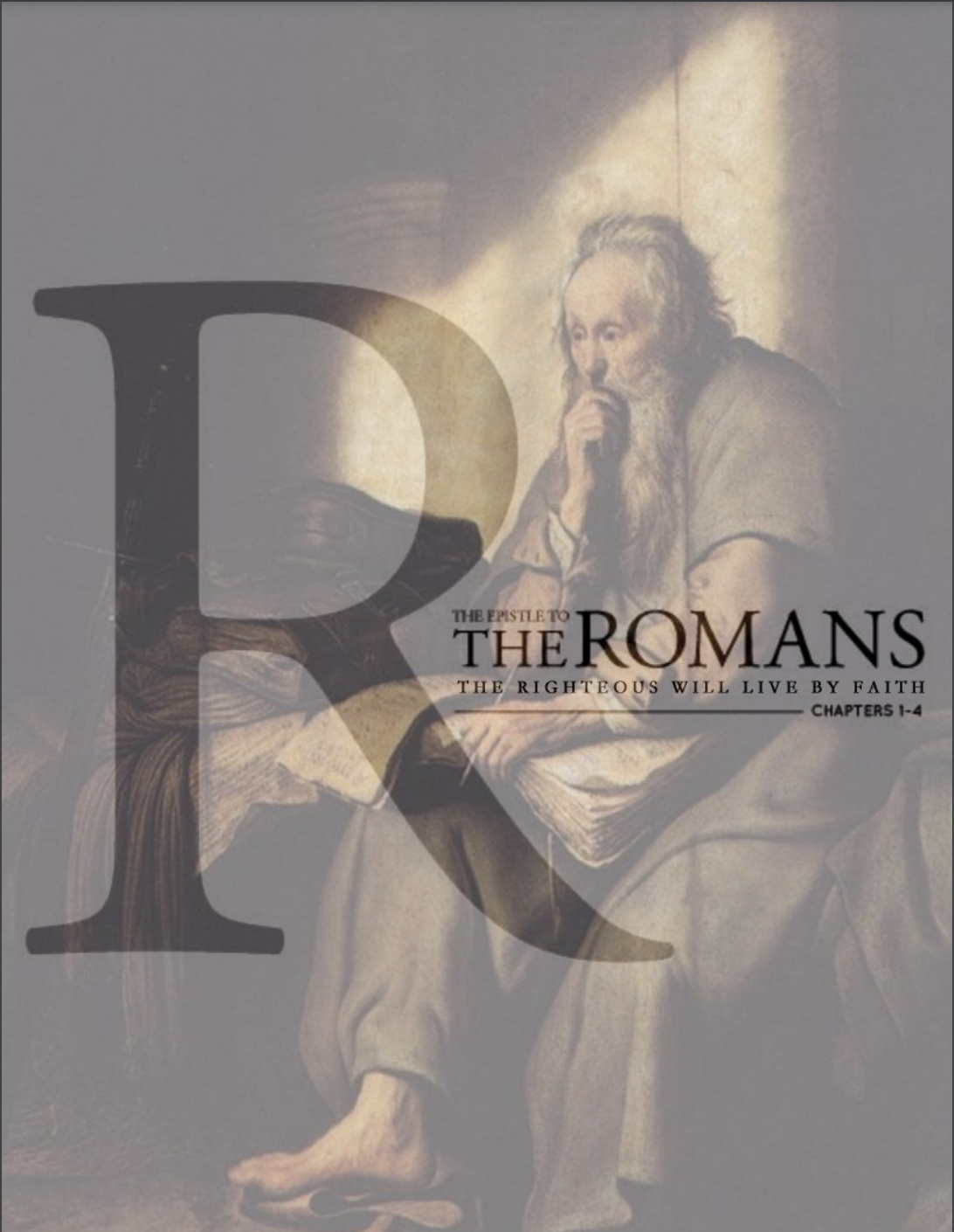
[Romans Study 10-2]
Our Justification and ‘Therefore’ [Romans 5:1-2]
5 Therefore, since we have been justified through faith, we have peace with God through our Lord Jesus Christ,
Regeneration; Rebirth
How can fallen human beings be regenerated? Only when we place our faith in Christ. Only Christ offers a cure for the total depravity of the human heart. We need Jesus and His righteousness so that with this righteousness we can become alive. Before salvation, we were degenerate; after salvation we are regenerated. Just as Justification is what God did for us, regeneration is what God does for us at the moment of salvation. God is the author of regeneration.
Another word for regeneration is rebirth, meaning ‘born again.’. Our rebirth is distinguished from our initial birth – our physical birth – when we were conceived physically, inheriting our sin nature from Adam. The Bible tells us, therefore, we must be born again. We must be born of spirit again, not remaining as born of flesh. Jesus said to Nicodemus, no one can see the Kingdom of God unless they are born again (John 3:3). “And God raised us up with Christ and seated us with him in the heavenly realms in Christ Jesus,” (Ephesians 2:6)
Just as our first, physical birth resulted in our entering the earthly realm as a child of Adam, our second, spiritual birth results in our entering the heavenly realm as a child of God, as a new creation in Christ. The new birth is a spiritual, holy, and heavenly birth that results in us becoming alive spiritually.
Fallen humans do not need renovation, reformation, or reorganization, but rebirth. Prior to salvation we were God’s enemies and children of wrath (Ephesians 2:3, Romans 5:18–20) but after salvation, we are God’s loving children. Regeneration is a radical change. We may understand regeneration as justification. There is no way for fallen human beings to be regenerated without being justified by God’s grace. Regeneration and justification are absolutely necessary or we will die in sin and darkness, not knowing the great grace and mercy of God. Regeneration and justification kick off the process of sanctification wherein we become the people God intends us to be (Romans 8:28–30).
Justification is a radical change, it is a great spiritual change. Though we appear the same today as yesterday, spiritually we are not the same. The form is the same but quality is totally different. Outwardly and physically, there may be no visible difference, yet internally and spiritually, we have become a totally new person, a new creation. God’s salvation, His justification and regeneration, are complete and perfect. Once and for all. Jesus’ precious blood on the Cross is more than enough to conquer all darkness of sin. No manner of animal sacrifices could compare. Justification is what God has done through Christ for us. Therefore, it is instantaneous and complete. We may claim it so long as we trust, not in ourselves, but in what God has done for us through Jesus. It belongs to us forever. Nobody can revoke or reverse our salvation. We should never forget that this righteousness is not earned by our work, and our salvation does not depend on us nor how good we are. It depends completely and solely on Christ and what He has already done for us through His death on the Cross.
When you are asked this question, “are you saved?”, do not get confused between your justification and sanctification, and judge your spiritual progress by your work of sanctification. Sanctification has no bearing on justification. That is, even if we live morally imperfect lives, we are still unchangingly justified. Do not look at yourself in terms of what you have done and what you are doing (i.e. being reigned by the law); but look at God, and what God has already done for you (i.e. being reigned by God’s grace). Look outward to the work of Christ and upward to the underserving grace of your justification that is already given to you, complete and perfect. It is the unchanging, finished, atoning work that Jesus presents to you. The result of justification is eternal life. Trust the work He has already done for you and receive the free gift of eternal life.
Process of Salvation
Our mysterious and wonderful salvation may be described in the three stages:

All in all, we are saved by nothing but by the grace of the Lord.
We are not justified, forgiven, and regenerated as the new creation by doctrine (of Justification) but by the work of Christ, through His sacrificial and substitutional death for us. With faith we must trust in this great grace and love.
Three Important Questions To Ponder
Let us re-examine the justification that God has granted us with these questions and answers: “Is faith our righteousness?; What is our faith?; Do we earn or receive justification?”
We are justified by faith. Then is faith our righteousness?
We are not justified by our works, nor by our righteousness. But we are justified because of Christ’s work, because of His righteousness. So the answer is no, because Christ is our Righteousness.
Then, what is faith? What merit does faith carry?
Faith itself is not righteousness. Faith by itself grants us no merit. Faith is the instrument through which we receive justification from God. Faith is only an instrument through which
God’s righteousness reaches us. Yet it is the only instrument through which it reaches us.
Do we earn or receive justification?
We cannot do anything to be righteous by our works. It is impossible for us to labor and earn justification from God, we can only trust God to provide His salvation. We cannot work to earn His justification as there is nothing we can do to earn salvation in any way, except through faith in the power of the blood of Christ.
Peace, ‘of’ God or ‘with’ God?
5 Therefore, since we have been justified through faith, we have peace with God through our Lord Jesus Christ,2 through whom we have gained access by faith into this grace in which we now stand. …
What an important word – peace! People in this world long for and seek deeply for peace. To find peace of mind, some turn to drink, some to drugs, others for pleasure, others to cults – all of whom are seeking this elusive ‘peace’. Christians also yearn for peace, but we should know that true peace comes from God. “And the peace of God, which transcends all understanding, will guard your hearts and your minds in Christ Jesus.” (Philippians 4:7)
The peace of God that ‘transcends all understanding’ is something that we need when surrounded by problems, difficulties, and trials. But this peace comes to those who are well established in the Christian life, not those are attempting entry into that life. Here, the Apostle Paul is dealing with something more fundamental and primal in our Christian life. Before seeking the blessing of peace from God, we must be at peace with God first and foremost. Then the question comes, ‘How do we stand before God?’ When we are in this position, before we receive ‘peace of God’, we must be at ‘peace with God’.
Then, how do we gain this peace with God? When we are ‘being justified by faith’, then ‘we have peace with God through our Lord Jesus Christ’. This peace comes through justification by faith, and by this alone. The result of the perfect work of the Lord Jesus Christ is that man can be at peace with God as God is at peace with him. God at peace with us, and we at peace with God. The communion between God and man, broken by sin and the Fall, is re-established.
John Newton’s Conviction of Christ’s Work
Before his conversion, John Newton had been engaged in slave trading and trafficking. He had been a vile and a foul sinner. There was scarcely a sin that he had not committed. You could understand, therefore, how the devil would bombard him with the dredges of his past. Flashing before his eyes this evil panorama, the devil would then challenge him, ‘Do you still claim to be a Christian, forgiven and at peace with God?’ But John Newton gave his answer, an answer that could silence the devil.
“Approach, My Soul, the Mercy-Seat” by John Newton,
1725-1807 Be Thou my Shield and Hiding-place, That, sheltered near Thy side, I may my fierce Accuser face And tell him Thou hast died.
He says in effect, ‘What can I tell him? I cannot tell him that I am a good man, I cannot tell him about my past or even my present. There is only one way of silencing him; “I can my fierce accuser face, and tell him Thou hast died”, for me and my sin.’
Peace with God, Sure Possession of the Justified
The important thing for us to remember is that Christ has died for us and our sins. By His death on the Cross, were our sins swabbed by His righteousness. Therefore, we have been justified by His righteousness. Grasping this blessed doctrine of justification is the only way to silence the accusations of our own conscience and of the devil, and to be truly at peace with God. There is no peace between man and God until a man grasps this doctrine of Justification. It is the only way of peace.
“Therefore, since we have been justified through faith, we have peace with God through our Lord Jesus Christ,” (Romans 5:1)
What is the Apostle doing here? He is not exhorting us to have peace with God; he is reminding us that we already possess it perfectly.
“through whom we have gained access by faith into this grace in which we now stand. …” (Romans 5:2)
And in this next statement he goes on to say, ‘through whom we have gained access.’ We already have it in our hands. It is not an exhortation; he is simply urging us to realize what we already have.
Can you visualize yourself lying on your deathbed? What feelings come to you? Are you still afraid of death? Do you still fear the judgment of God? If you are, you cannot say, ‘I have been justified by faith and am at peace with God’. If your faith cannot stand up to these tests it is not a truly Christian faith.
Peace with God – this is our unchanging standing (status) before God and in our relationship with God. Through nothing but our Lord Jesus Christ, have we gained access by faith into this grace in which we now stand (Romans 5:2). ‘Therefore’, as the Apostle says, therefore, let us embrace it and rejoice in it.
[Study Questions]
1. Explain the meaning of the phrase, ‘Therefore’: “Therefore, since we have been justified through faith, we have peace with God through our Lord Jesus Christ.” (Romans 5:1)
2. Define regeneration. Why is regeneration absolutely necessary?
3. Explain the differences between justification and sanctification.
4. What message of the Bible would you give to the one who does not have conviction of his/her salvation?
5. How is the peace in Philippians 4:7 different from the peace in Romans 5:1? Do you agree that peace with God should be earned before the peace of God? Why or why not?
6. “There is no more thorough test of our profession of Christianity than this: are we enjoying this peace with God? There are many, alas, in the Church who dispute this altogether. They say that a Christian is a man who is hoping that he is going to be forgiven, and that at the end he will go to heaven. But that is not the Apostle’s teaching.” Based on today’s message, share your reflection on the statement, and explain the Apostle’s teaching regarding the peace with God.
[Prayer]
“So he said to me, “This is the word of the LORD to Zerubbabel: ‘Not by might nor by power, but by my Spirit,’ says the LORD Almighty.” (Zechariah 4:6)
Not by our might nor by our deeds but by your Spirit and love have we been justified. Nothing from us but only by the blood of Jesus have our many sins been covered. Now as the inevitable consequence of your perfect work, we stand justified before God.
Lord, through the first two verses of the fifth chapter of Romans you have taught us what incredible and amazing love you poured upon us. May we never forget your great sacrifice on the Cross, once for all, and may we fix our eyes upon you. May we have the deep assurance in the precious justification you have granted and rejoice in the peace with God forevermore. In Jesus’ name, Amen.
Republished with permission from Dr. Christy Tran, the author of “The Epistle to the Romans: Paul’s Love Letter from God.”
